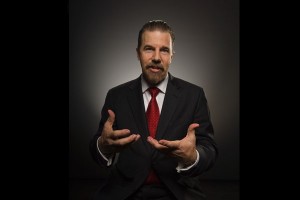Meet the Middle Man: Former Mexican Cabinet Minister Steers Texas Republicans Into Future
 FOUR WEEKS BEFORE THE 2008 PRESIDENTIAL ELECTION, Juan Hernandez flew from Washington, D.C., to Phoenix for an interview on the Spanish-language news channel Univision. A charismatic public speaker and cheerleader for the Republican cause, Hernandez had been candidate John McCain’s Hispanic outreach director for 14 months. “I’d left my home and family in Fort Worth, not even thinking about how I was going to make money for the next year, because I would be working as a volunteer,” he recalls. “I was living in a cheap hotel called the Americana so that I could work out of the Washington, D.C., headquarters and be there every morning for the 7:30 strategy meetings.”
FOUR WEEKS BEFORE THE 2008 PRESIDENTIAL ELECTION, Juan Hernandez flew from Washington, D.C., to Phoenix for an interview on the Spanish-language news channel Univision. A charismatic public speaker and cheerleader for the Republican cause, Hernandez had been candidate John McCain’s Hispanic outreach director for 14 months. “I’d left my home and family in Fort Worth, not even thinking about how I was going to make money for the next year, because I would be working as a volunteer,” he recalls. “I was living in a cheap hotel called the Americana so that I could work out of the Washington, D.C., headquarters and be there every morning for the 7:30 strategy meetings.”
When Univision came calling, Hernandez figured it was a no-brainer. The United States’ top-rated Spanish-language channel was crucial to reaching Hispanic voters. Before saying yes, he says, “I checked it out with the campaign manager. He said ‘fine,’ and I flew to Phoenix.” When Hernandez arrived at the TV station, he encountered the puzzled faces of a receptionist and a producer. “They said, ‘Uh-oh. We’ve got a problem, because someone from your campaign called and told us the interview was canceled.’”
It wasn’t the first time. Since McCain had asked Hernandez to lead his Hispanic outreach, the campaign had agonized to the point of paralysis over how to appeal to Hispanics without alienating the Republican base of older Anglos. “McCain would tell me, I want to have behind me many Hispanic-looking faces at this press conference,” Hernandez recalls. “So I would call and have 10, 12 women, men, doctors, nurses, laborers, and they would be invited and then not be put in the photograph. Instead there would only be white males over 50 in the photograph, and this would happen over and over again.”
Hernandez says the campaign filmed TV spots with McCain talking about the need for immigration reform and praising Hispanic veterans, but it never aired—or even appeared on the candidate’s website. “At one point, in great frustration, I went up to John and said, ‘I just want to thank you, sir, but I really have to leave. None of what I believe you hired me to promote is being promoted.’ He embraced me and wouldn’t stop embracing me, and he said, ‘Juan, don’t leave.’ And so I stayed for the rest of the campaign, but I was frozen.”
It didn’t help that groups like Americans for Legal Immigration were attacking Hernandez on the airwaves and over the Internet, calling him an “open borders extremist” and urging McCain to fire him. Bilingual and a citizen of Mexico and the United States, Hernandez had once worked for Mexican President Vicente Fox, advocating for Mexican migrants in the United States. Some accused him of being a reconquistador, especially when he became a frequent foil on Cable TV for anti-immigration champions like Lou Dobbs and Bill O’Reilly. In a 2001 Nightline news segment about his work for the Mexican government, Hernandez said of undocumented immigrants, “We want them to know they’re not second-class citizens because they crossed a line.” When Hernandez was asked whether it was right to participate in the politics of both countries, he responded: “There are 20 million in the United States with one foot in Mexico and the other foot in the United States—if they want to attack me, then they’re attacking 20 million people.”
Hernandez, a conservative Christian and a lifelong Republican, sounded like a heretic to the anti-immigration set—or, even worse, “an open borders and sovereignty undermining extremist,” as the conservative pundit Michelle Malkin called him on her blog. On Fox News, Hernandez battled O’Reilly, Malkin and other conservatives over immigration reform. During one heated debate with Malkin in 2008, he exhorted her to “have a heart” for 1,300 undocumented workers arrested in an immigration raid shortly before Christmas. “I have a heart for people who have followed the laws to come into this country,” Malkin shot back.
“Every day it felt like acid in my stomach,” Hernandez says, remembering his tumultuous months trying to build a bridge between the McCain campaign and Hispanic voters. The right-wing attacks and the paralysis within McCain’s campaign over Hispanics taught Hernandez a powerful lesson, he says. “Hispanics need to be participating in the debate from the inside, not the outside. How can we ever fix immigration if Hispanics aren’t at the table?”
The only way to save the Republican Party, he decided, was to get more Hispanic candidates to run under the Republican banner. “Maybe it’s getting too religious, but I think Republicans have gotten too far away from the basic values that Hispanics hold very precious: family, hard work and faith in God,” Hernandez says. “So winning elections, getting more Hispanics into the Republican Party, can only do the party good.”

